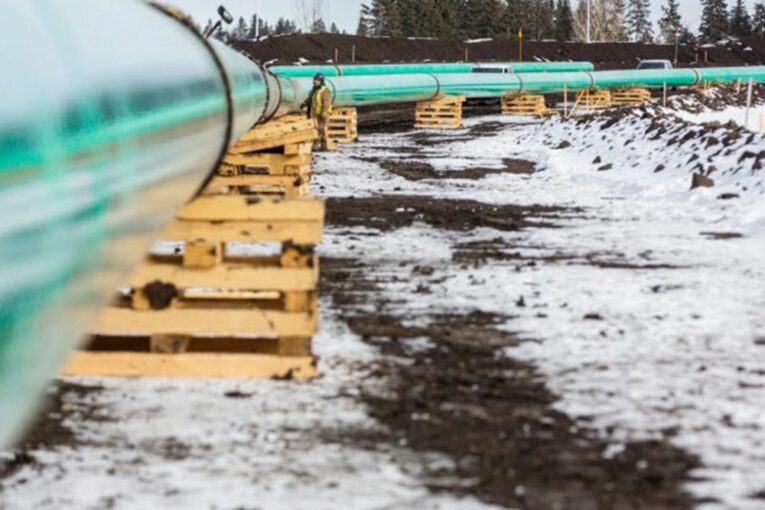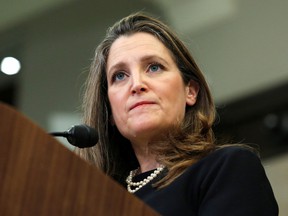
Finance Minister Chrystia Freeland, facing a gigantic bill from the federal government’s COVID-19 rescue effort, said the Trans Mountain pipeline will receive no more federal funding, even though the Crown corporation that owns the pipeline revealed on Feb. 18 that construction costs have surged by some 70 per cent.
“There will be no additional public money invested in TMC,” or Trans Mountain Corp., the company the federal government created when it bought the pipeline in 2018, Freeland said at a press conference. “TMC will secure necessary funding to complete the project through third-party financing, either in the public debt markets or with financial institutions.”
Prime Minister Justin Trudeau’s government bought Trans Mountain from Kinder Morgan Inc. for $4.5 billion to keep the project alive. It would expand capacity to 800,000 barrels per day from 300,000, and give oil producers in Alberta a meaningful connection to Asian markets, which should result in higher prices. The oilpatch currently is at the mercy of conditions in the United States, and transportation bottlenecks tend to depress prices by creating a glut of Canadian bitumen.

“The Trans Mountain Expansion will ensure Canada receives fair market value for our resources,” said Freeland, adding that BMO Capital Markets and TD Securities, hired to offer Bay Street counsel, have both advised that the project remains commercially viable and that financing can be easily arranged.
“Our government acquired TMC and the Trans Mountain Expansion project in 2018 because we knew that it was a serious and necessary investment,” Freeland said. “This project is in the national interest and will make Canada and the Canadian economy more sovereign and more resilient.”
It might, but at an ever increasing cost. Trans Mountain chief executive Ian Anderson said in a statement that costs have increased to $21.4 billion from $12.6 billion at the time of the company’s previous update. Anderson cited delays caused by the pandemic and the November floods in the Hope, Coquihalla, and Fraser Valley areas as partially responsible for the cost overrun.
“The progress we have made over the past two years is remarkable when you consider the unforeseen challenges we have faced including the global pandemic, wildfires and flooding,” said Anderson. “At every step of the way, we have found solutions and responded. As a result, the project is advancing with significantly improved safety and environmental management, and with a deep commitment to ensure this project is being built the right way.”
Anderson said the target date for “mechanical completion” was the third quarter of 2023.
“Notwithstanding the cost increase and revised completion schedule, the business case supporting the project remains sound,” he said.
The oilpatch also remains supportive of the project. Suncor Energy Inc. chief executive Mark Little said the pipeline is crucial to the country and sector.
“While like everyone we are disappointed in the increased costs and schedule of the TransMountain project, we remain fully supportive of this world-class infrastructure project which is vital to Canada’s long-term economic success and energy security,” he said.
“The 2021 B.C. floods were a reminder of how critical this energy infrastructure is to both the security of energy supply to British Columbians and access for Canadian resources to global markets.”
Freeland’s decision to quickly shut the door on even the possibility that the federal government might come to Trans Mountain’s aid reflects the difficult fiscal situation in which she finds herself after two years of generously helping households and businesses survive the pandemic.
The federal budget deficit narrowed to $73.7 billion between April and November, compared with $232 billion in the same period a year earlier, but net debt remained elevated at $1.2 trillion, according to the Finance Department’s latest accounting.
• Email: [email protected] | Twitter: CarmichaelKevin
You can read more of the news on source
